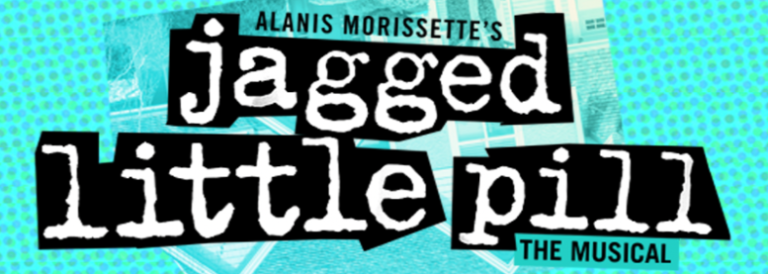The enormously popular musical inspired by and filled with songs from Alanis Morissette’s beloved 1995 album, the Broadway tour of Jagged Little Pill hit DC’s National Theatre from March 14th-26th. I’m no virtuoso of musical theater production. Still, if the standing ovation indicated anything to me, I certainly wasn’t the only one who enjoyed the amalgamation of rock music and interpretive dance that is Jagged Little Pill.
The following paragraphs break down the dazzling aspects of the production, a few critiques, and their relevance to GW students. Let’s get right into it!
The Play Itself
Creating a beautiful story of the often ignored hardships lurking behind the facade of a happy suburban family and tying it into popular songs by Morissette like You Oughta Know and Forgiven was an incredibly moving viewing experience. Director Diane Paulus combines Morissette’s stunning lyricism and inspiration from Diablo Cody’s book into a production fitting Washington’s very own National Theatre. JLP isn’t for the faint of heart, as it deals with serious issues, including sexual assault, gender and ethnic identity struggles, and drug addiction. Gasps from the packed audience were ever so common during [spoiler alerts!] Mary Jane’s Overdose and the sexual assault of high schooler Bella.
The Direction/Acting
Director Diane Paulus and Dance Captain Claire Crause worked hand in hand to produce a production that effectively transported audiences into suburban Connecticut. The Healy family perfectly meshed together into one troubled unit: Mary Jane Healy as the drug-addicted mother [Delaney Brown], Steve Healy as the sexually frustrated and lonely father [Chris Hoch], Nick Healy as the golden child struggling with the pressures of success [Dillon Klena], and finally, Frankie Healy as the adopted daughter navigating her sexual and racial identity [Lauren Chanel]. Underscoring this stunning story of resilience through family trauma is another story told through interpretive dance and a rockin’ live band that occasionally featured center stage. The subject matters of this show can be a hard pill to swallow (pun intended). Still, the depictions of rape and overdose, as shown through the remarkable dance skills of Jena VanElslander and the ensemble cast, deliver a beautiful acknowledgment of #MeToo and drug awareness without provoking a feeling of uneasiness within the audience over the sensitive subject matters.
Morissette’s musicality couples beautifully with the raw human emotion shown through dance in a way that captures the uniqueness of every survivor’s experience.
The Design (Set/Costume)
The set design utilized projected images to distinguish between different settings: from the Healy Home to the halls of a High School brimming with ruthless teens to the bustling streets of New York, and, of course, the cold walls of Mary Jane’s hospital room. A few moving set pieces like the pews of a church and an abandoned swing set add substantially to musical numbers like Frankie and Phoenix’s [Rishi Golani] love song on the abandoned playground and Mary Jane’s heart-wrenching confessional for salvation at church. There’s not much to say about the costumes except that they were on point. Some of Frankie’s outfits looked like they might have been ripped directly from my 16-year-old self’s closet.
Yet as much as I loved JLP, this wouldn’t be much of a review if I didn’t leave some critiques. While it was a delight to watch such an original performance that tackled topical issues while remaining humorous and a fist-pumping ode to teenage angst and family struggle, it ran into the same problem many Jukebox musicals have faced. One of the challenges of combining dozens of songs from an album and trying to puzzle-piece them into a coherent performance is that many characters and narratives feel one-note or created only to set up a song. One of these curated characters is Jo, Frankie’s girlfriend, who ends up singing one of Morissette’s most coveted songs, You Oughta Know, after being cheated on by Frankie. This plot point ultimately leaves a bad taste in the audience’s mouth regarding Frankie, a main character we’re supposed to sympathize with as she navigates through family turmoil and identity struggles.
Instead of jamming in so many themes and characters to set up Morissette’s music, the show could have benefited from narrowing in on the Healy family and axing the scorned girlfriend character who exists purely to add to the show’s song count.
In reflection of a play that left me truly moved and grasping at the cushion of my seat at The National Theatre, JPL was indeed a once and a lifetime viewing experience. Utilizing the creative genius of Alanis Morissette to facilitate important conversations on addiction and identity struggles leaves audiences not only entertained but informed. The relevance of JLP to GW students can be shared amongst all young adults and students struggling with the many issues addressed and shared in the musical.
After seeing Jagged Little Pill at the National Theatre, I felt more accepting of myself and the journey that has led me to where I am today. Through my low points in life, I have found happiness and contentment with the value of human imperfection, much like the Healy family in JLP. In the words of Alanis Morissette herself, “Confusion, anger, fear, and sadness are of equal value to happiness, excitement, and inspiration.”

